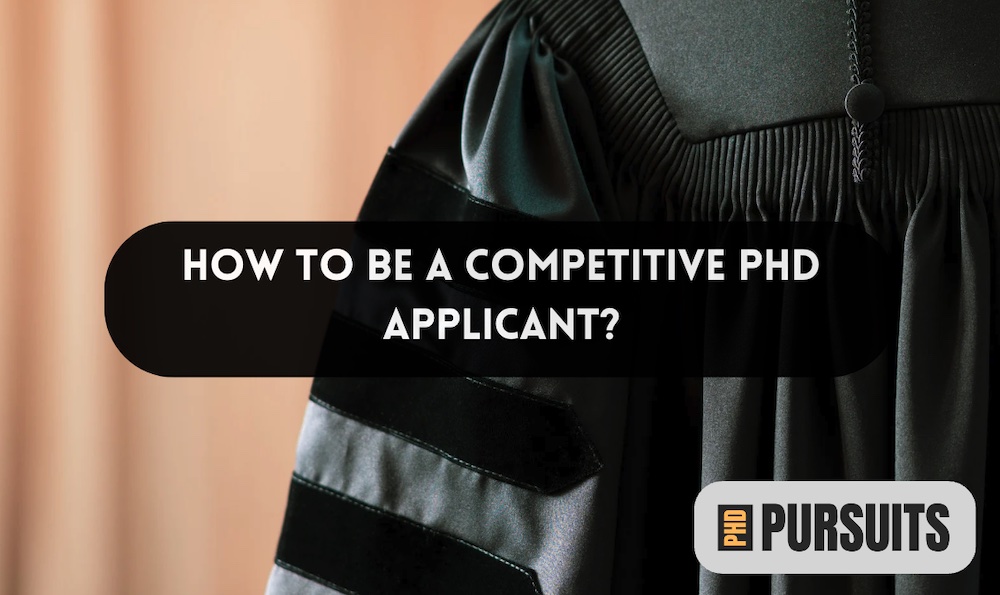Are you looking to apply to study for a PhD, yet are unsure how to increase your chances of success? How to be a competitive PhD applicant?
To be a competitive PhD applicant:
- Deep Dive into Research Interests
- Accumulate Meaningful Research Experience
- Achieve Academic Excellence
- Cultivate Relationships for Strong Recommendations
- Showcase a Tailored CV
- Articulate Your Vision in the Personal Statement
- Prepare for the GRE, if Required
- Understand the Faculty and Their Work
- Engage in Academic and Professional Communities
- Reflect on Your Fit and Contributions to the Program
In this post, we share 10 tips how you can be competitive when applying for a PhD program, be it is since of humanities. We also look at what admission committee wants when sifting through applications.
What Do Admission Committee Wants From PhD Applicants?
When graduate school admissions committees sift through applications, they’re not just looking at numbers and checkboxes. They’re looking for potential PhD students who will thrive in their programs and contribute to academia.
Here’s what they typically seek in applicants:
Research Experience
Committees want applicants with a solid foundation in research. This could stem from:
- an undergraduate thesis,
- lab work, or
- involvement in research projects.
It’s not just about participation; it’s the depth of engagement and what you’ve learned from these experiences that matter.
Clear Research Interests
Having focused research interests that align with the program and faculty members is crucial. This shows you’ve done your homework and are applying to the program for the right reasons.
It also makes it easier for committees to match you with potential advisors.
Academic Excellence
A high GPA is valued, but it’s not the only indicator. Committees look at the courses you’ve taken, the rigor of your undergraduate program, and how you’ve challenged yourself academically.
They’re looking for signs of your intellectual curiosity, and resilience when facing the difficulties during your PhD study.

Strong Letters of Recommendation
Letters from professors who know you well and can speak to your:
- abilities,
- work ethic, and
- potential as a graduate student.
These letters should provide insight beyond what can be gleaned from transcripts and test scores.
Well-crafted Personal Statement
This is your chance to tell your story. A compelling personal statement that ties together your:
- past experiences,
- current research interests, and
- future goals
can significantly impact your application to enter grad school.
Fit with the Program
Committees are looking for doctoral candidates whose research interests and goals align with the strengths of the program.
They want students who will benefit from what the program offers and contribute to the intellectual community.
Communication Skills
Your ability to communicate, both in writing and potentially in an interview, is key. This includes your
- personal statement,
- CV, and
- any correspondence with the program.
Clear, concise, and compelling communication indicates that you’re ready for the challenges of a PhD program.
Potential for Contribution
Ultimately, committees are looking for applicants who have the potential to contribute to their field.
This might be through innovative research, teaching, or collaboration with others in the academic community.
Admissions committees take a holistic approach, considering all aspects of your application to determine your fit and potential. It’s not just about meeting the minimum requirements but about demonstrating your readiness and enthusiasm for the challenges of a PhD program.
How To Be A Competitive PhD Applicant?
Becoming a standout PhD applicant requires a blend of academic achievements, research acumen, and personal attributes that signal your potential to thrive in a rigorous academic environment. Here are ten tips to position yourself as a competitive candidate for PhD programs.
Deep Dive into Research Interests
Clarity in your research interests is not just beneficial; it’s critical. It guides you to the right programs and professors and shapes your application narrative.
If you’re intrigued by a niche area of study, explore it through undergrad research projects or your thesis. This focused interest shows you’re not just a wandering academic but someone with a mission.

Accumulate Meaningful Research Experience
The weight of your research experience can tip the scales in your favor. PhD is after all, a research degree.
Whether it’s contributing to a professor’s project, conducting your undergrad thesis, or presenting at conferences, these experiences underline your readiness for PhD-level research.
They’re proof that you’re not just theoretically inclined but also practically capable. Make sure to indicate these in your PhD applications.
Achieve Academic Excellence
A strong GPA is undeniably important. It’s a straightforward indicator of your academic prowess. Strive for excellence in your courses, especially those relevant to your prospective field of study.
While the occasional B won’t derail your chances, consistently high grades across the board, particularly in advanced classes, highlight your intellectual capabilities.
Showcase a Tailored CV
Your CV is your academic biography. It should list your educational background, research experience, publications, presentations, and any relevant academic achievements.
Ensure it’s tailored to highlight experiences most pertinent to the PhD program and field you’re applying to.
Articulate Your Vision in the Personal Statement
Your personal statement is your opportunity to connect your past experiences with your future goals. It’s where you articulate
- why you want to pursue a PhD,
- what research questions drive you, and
- why you’re a good fit for the specific program.
Make it compelling, clear, and reflective of your genuine interests.
Prepare for the GRE, if Required
While not all programs require it, a strong GRE score can complement your application, particularly in competitive fields. It can serve as an additional metric of your readiness for graduate-level study.
Understand the Faculty and Their Work
Knowing the professors in the program and aligning with at least one faculty member whose research interests match yours can significantly enhance your application.
This alignment not only increases the likelihood of finding a willing advisor but also demonstrates your informed interest in the program.
Engage in Academic and Professional Communities
Active engagement in academic communities, whether through online forums, university clubs, or professional organizations, shows your commitment to your field.
It can also provide networking opportunities and additional insights into your area of study.
Reflect on Your Fit and Contributions to the Program
Consider what unique perspectives or skills you bring to the program. PhD admissions committees are not just looking for smart students; they’re looking for individuals who will contribute to the academic community in meaningful ways.
Reflect on your experiences during your application process, and mention how these experiences have prepared you to not only succeed in the program but also enrich it.
Cultivate Relationships for Strong Recommendations
The professors who pen your letters of recommendation should know you beyond the classroom. They should be able to vouch for your intellect, work ethic, and potential as a researcher.
Choose professors who have overseen your research or with whom you’ve taken multiple, in-depth courses. Their endorsements can significantly bolster your application.

How To Be A Competitive PhD Applicant? PhD Application Tips
Becoming a competitive PhD applicant is about more than checking boxes; it’s about crafting a narrative of your academic journey that highlights your readiness for and commitment to pursuing a PhD.
From the specifics of your research interests to the broader strokes of your academic and professional engagements, each element of your application should reinforce your suitability and potential as a future scholar.

Dr. JW Ong holds academic degrees, including a Ph.D. in Applied Linguistics from universities in New Zealand, Malaysia, and the UK. He started PhDPursuits.com as a way to share the experience he wish he would have had known before embarking on his PhD.

